
by Fishgate@sanap | Mar 31, 2025 | Announcement, Marion Island, News, SANAP
High Pathogenicity Avian Influenza (H5n1) confirmed on Subantarctic Marion Island
Press Release by the Department of Forestry Fisheries and the Environment: 23 March 2025
The presence of high pathogenicity avian influenza (HPAI) H5N1 virus on Marion Island has been confirmed. Samples collected between September and December 2024 were all shipped back to mainland South Africa, via the SA Agulhas II, in February 2025. In March, Polymerase Chain Reaction (PCR) testing confirmed infection in six bird species, comprising Wandering Albatross (Diomedea exulans), King Penguin (Aptenodytes patagonicus), Brown (Subantarctic) Skua (Stercorarius antarcticus), Southern Giant Petrel (Macronectes giganteus), Northern Giant Petrel (M. halli) and Sooty Albatross (Phoebetria fusca).
Following an initial suspected HPAI case in a Brown Skua at Marion Island (a bird showing clinical signs of HPAI infection including twitching and tremors) in mid-September 2024, more similar cases were reported in early November and mortalities in multiple species have continued into March 2025, though the overall death rate slowed significantly in January. The reduced mortality rate is promising, but 31 bird species breed on Marion Island and the bird species and age composition varies throughout the year, therefore it is difficult to predict how the outbreak will progress. The potential effects on marine mammals are also of concern but no increased mortality has been reported in any mammal species so far.
Among Wandering Albatrosses, chicks were mostly affected, with at least 150 of approximately 1900 chicks from the 2024 cohort having died. However, adults have been affected worst in other species: at least 80 adult Brown Skuas, and approximately 120 adult King Penguins. Much smaller numbers of affected giant petrels (at least 20 Southern and four Northern) and Sooty Albatrosses (five) have been observed. The deaths of adult seabirds are of greater concern than chicks, because most species only start to breed at 3 to 10 years of age, and most affected species raise at most one chick per year. There are also a multitude of other threats to seabirds, including fisheries bycatch, climate change, plastic pollution and predation by introduced house mice on Marion Island.
Marion Island, along with neighbouring Prince Edward Island, provides critical breeding and moulting grounds for millions of seabirds and marine mammals, including nearly half of the worlds Wandering Albatrosses, hundreds of thousands of penguins, and large numbers of Southern Elephant Seals and Subantarctic and Antarctic Fur Seals. The Archipelago is located in the south western Indian Ocean, about 2000km southeast of Cape Town and halfway between Africa and Antarctica.
Observations of and laboratory test results for HPAI (H5N1) on Marion Island can assist in inferring the potential risk to animals on Prince Edward Island, since they share various ecological characteristics. Visits to Prince Edward Island are limited to one visit every four years, to limit human impacts on the island and preserve its pristine state, and the last survey was undertaken in November 2023.
Having spread around the globe since 2021, HPAI (H5N1) was detected in seabirds and marine mammals in South Georgia, southeast of South America, in October 2023. It reached the Antarctic Peninsula in February 2024 and was detected at the French archipelagos of Crozet and Kerguelen (950 and 2300 km east of Marion respectively) in October and November 2024. The virus can be transported long distances by migrating birds, and the virus moved from South Georgia to the French islands.
The situation on Marion Island is being closely monitored by the field personnel overwintering on the island, who have been trained to recognise possible HPAI signs in birds and seals, and in the necessary monitoring and mitigation methods. They will continue to take all precautions to ensure they do not spread the virus. There are few other disease mitigation tools available in this type of situation.
The HPAI protocol [SANAP Protocol for the Management of Avian Influenza (20 April 2024) PDF – 960.4 KB] that has been implemented on Marion Island was developed by the Department of Forestry, Fisheries and the Environment, the management authority for the Prince Edward Islands, together with Western Cape Veterinary Services, marine ornithologists, marine mammal biologists, disease experts and colleagues overseas with similar experience. Efforts to monitor and hopefully limit the spread of the virus on the island will continue.
For media enquiries please contact:
Thobile Zulu-Molobi
Mobile: +27 82 513 7154
E-mail: tmolobi@dffe.gov.za
or
Peter Mbelengwa:
Mobile: +27 82 611 8197
E-mail: pmbelengwa@dffe.gov.za
by Ria Olivier | Feb 3, 2025 | Announcement, Geomorphology, Important Dates, Research, SANAP, SANAP Student, Science
 The International Conference on Geomorphology (ICG) 2025 is set to take place in breathtaking New Zealand, a land renowned for its dynamic landscapes and geological wonders. This global gathering of geomorphologists will provide a platform for cutting-edge discussions on landform processes, climate interactions, and Earth surface dynamics. We invite researchers, early-career scientists, and professionals to contribute to this exciting event by submitting abstracts to the special session:
The International Conference on Geomorphology (ICG) 2025 is set to take place in breathtaking New Zealand, a land renowned for its dynamic landscapes and geological wonders. This global gathering of geomorphologists will provide a platform for cutting-edge discussions on landform processes, climate interactions, and Earth surface dynamics. We invite researchers, early-career scientists, and professionals to contribute to this exciting event by submitting abstracts to the special session:
Geomorphological Insights from the Sub-Antarctic
Description: Sub-Antarctic islands, situated in the remote Southern Ocean, offer a unique geomorphological perspective due to their distinct geographical setting. These cold islands, characterized by both glacial and periglacial processes, provide crucial insights into the historical and ongoing changes in oceanic and atmospheric circulation patterns within the southern hemisphere mid-latitudes. Unlike their northern hemisphere counterparts, these islands experienced a different Last Glacial Maximum (LGM) and complex deglaciation, leading to unique geomorphological features and processes. The landforms of these islands serve as invaluable proxies for understanding landscape responses to climate change. Palaeo-climatic shifts have profoundly influenced geomorphological and cryogenic dynamics, shaping landforms and influencing ecosystem processes. Contemporary climatic changes, such as rising temperatures, moisture fluctuations, and increased frequency of extreme events, pose significant threats to these delicate geomorphological systems. These changes have the potential to push landscape and ecosystem processes beyond their existing environmental thresholds, impacting landforms and biodiversity. This session aims to explore the geomorphological significance of Sub-Antarctic islands and their role as indicators of environmental change. We invite contributions that highlight the geomorphological processes and dynamics that shape the landscape of these Sub- Antarctic Islands. Research focusing on the region’s geomorphological responses to past and present climatic conditions and the possible implications for ecosystem processes are particularly welcome. Emerging researchers are encouraged to submit their work to advance our understanding of these critical sentinel landscapes.

 Who Should Submit?
Who Should Submit?
We strongly encourage early-career researchers, postgraduate students, and experienced scientists to contribute their work. This is an excellent opportunity to showcase your research to an international audience, gain valuable feedback, and network with leading experts in the field.
Abstract Submission Deadline: 31 May 2025!!
Don’t miss your chance to be part of ICG 2025 and contribute to this vital discussion on the evolving landscapes of the Sub-Antarctic.
 Message from Prof Werner Nel:
Message from Prof Werner Nel:
“Dear Friends and Colleagues, We are putting a session together for the International Conference on Geomorphology that will be held in Christchurch in February 2026. As you can see the session description is very open, so we can really put a nice diverse session together. We would like to ask you to consider submitting an abstract to the session.
Hope to see you there. All the best.” Werner Nel

by Ria Olivier | Jan 17, 2025 | Announcement, Antarctica, Gough Island, Marion Island, Prince Edward Islands, SA Agulhas II, SANAE, SANAP, Southern Ocean

 The Department of Forestry, Fisheries and the Environment is pleased to announce the upcoming voyage schedule for the S.A. Agulhas II for the 2025/2026 season. This state-of-the-art polar research and supply vessel will continue its vital role in supporting South Africa’s research stations in Antarctica and the sub-Antarctic islands. Below is the planned itinerary provided by the Department of Forestry Fisheries and the Environment:
The Department of Forestry, Fisheries and the Environment is pleased to announce the upcoming voyage schedule for the S.A. Agulhas II for the 2025/2026 season. This state-of-the-art polar research and supply vessel will continue its vital role in supporting South Africa’s research stations in Antarctica and the sub-Antarctic islands. Below is the planned itinerary provided by the Department of Forestry Fisheries and the Environment:
 DOWNLOAD PDF Voyage Schedule 2025-2026
DOWNLOAD PDF Voyage Schedule 2025-2026
DOWNLOAD PDF Voyage Schedule 2026 – 2027
Please note that these dates are subject to change based on operational requirements and weather conditions. For the most up-to-date information, please refer to the official voyage schedule on the South African National Antarctic Programme (SANAP) website.
SANAP
We look forward to another successful season of exploration and research, furthering our understanding of these remote and vital regions.

by Ria Olivier | Oct 22, 2024 | Antarctica, Research, SA Polar Research Infrastructure, SANAP

 Antarctica, a pristine and remote frontier of scientific discovery, has long been a region of international interest for climate research, biodiversity, and understanding global environmental changes. In a recent meeting, held at SAEON Egagasini Node in Cape Town the event brought together South African National Antarctic Programme (SANAP) researchers and South African Polar Research Infrastructure (SAPRI) personnel to discuss how we can collaborate with the Arctic and Antarctic Research Institute (AARI) to share resources, infrastructures and expertise to protect and study this unique region.
Antarctica, a pristine and remote frontier of scientific discovery, has long been a region of international interest for climate research, biodiversity, and understanding global environmental changes. In a recent meeting, held at SAEON Egagasini Node in Cape Town the event brought together South African National Antarctic Programme (SANAP) researchers and South African Polar Research Infrastructure (SAPRI) personnel to discuss how we can collaborate with the Arctic and Antarctic Research Institute (AARI) to share resources, infrastructures and expertise to protect and study this unique region.
 Attending in Person, Prof Juliet Hermes, Prof Marcello Vichi, Dr Anne Treasure, Ria Olivier, Dr Robyn Verrinder, Thomas Mtontsi, Steve Tebele, Jonathan Ward, Mark McKechnie, Rabia Mathakutha, Dr Sandy Thomalla, Dr Alexander Makarov, Dr Maxim Tatarkin
Attending in Person, Prof Juliet Hermes, Prof Marcello Vichi, Dr Anne Treasure, Ria Olivier, Dr Robyn Verrinder, Thomas Mtontsi, Steve Tebele, Jonathan Ward, Mark McKechnie, Rabia Mathakutha, Dr Sandy Thomalla, Dr Alexander Makarov, Dr Maxim Tatarkin
The meeting was focused on several aspects, including enhancing scientific cooperation in the Antarctic, and exploring ways to share logistical and research capacities. Both SANAP and AARI have a long history of involvement in Antarctic studies, and these discussions is a step forward in research and innovation collaboration.
 The meeting was in hybrid format and was attended online by Dr Michael Kosch, Dr David Hedding, Dr Geoff Grantham and Yinhla Shihlomule
The meeting was in hybrid format and was attended online by Dr Michael Kosch, Dr David Hedding, Dr Geoff Grantham and Yinhla Shihlomule
Dr Makarov introduced the activities, research and infrastructure of the AARI. He provided context to the visit and introduced AARI science and collaboration strategy. Highlights were the major directions of AARI are Meteorology, glaciology, Sea-ice research, Ice physics, ocean-atmosphere interaction, polar geography, geophysics, oceanography, interaction of ship hull with sea-ice, multi-year permafrost, hydrochemistry and hydrology of estuaries and water resources
Short presentations by the South African delegation with discussions followed (Presentations available on ALSA archive)
 The in-person presenters that started the South African Discussions and presenatations: Dr Sandy Thomalla – SOCCO, Rabia Mathakutha – SAPRI, Ria Olivier- ALSA, Dr Robyn Verrinder-MARIS
The in-person presenters that started the South African Discussions and presenatations: Dr Sandy Thomalla – SOCCO, Rabia Mathakutha – SAPRI, Ria Olivier- ALSA, Dr Robyn Verrinder-MARIS
 The following presentations were done:
The following presentations were done:
- SOCCO: South Africa’s ocean-climate science and innovation programme:
Taking ocean climate science to society. Sandy Thomalla.
- The South African Polar Research Infrastructure. Rabia Mathakutha
- An Overview of the Antarctic Legacy of South Africa Ria Olivier
- Antarctic MIZ Observations: Interdisciplinary approaches to resolve seasonal sea-ice variability. Robyn Verrinder
- Geology of Western Dronning Maud Land, Antarctica – a brief history of Geological Evolution insights. Geoffrey Grantham
- SANAP Geological Research program 2024-2026 in western Dronning Maud Land, Antarctica. Geoffrey Grantham
- Landscape and climate interactions in the sub-Antarctic. David Hedding
- SuperDARN HF radar at SANAE, Instrument infrastructure for space weather research. Michael Kosch
- SANSA – Jonathan Ward
- BRICS-RELAY and Antarctica InSync. Marcello Vichi
Through collaboration, we are expanding our ability to understand and protect one of the planet’s most critical ecosystems as Antarctica holds answers to some of the world’s biggest environmental questions, and through collaboration, we can unlock those answers.”
 Dr Makarov present a gift to Prof Juliet Hermes of the ice resistant platform ‘North Pole’
Dr Makarov present a gift to Prof Juliet Hermes of the ice resistant platform ‘North Pole’
The discussion between AARI and SANAP and SAPRI signals a collaboration for Antarctic research, through shared resources, expertise, and data, both nations are poised to make significant contributions to global climate science. As the world watches the impacts of climate change unfold, this international collaboration offers hope for a deeper understanding of our planet and the preservation of its most fragile regions.

by Ria Olivier | Oct 11, 2024 | Announcement, Jobs, Marion Island, News, Overwintering Team, Research, SANAP, Science, Southern Ocean, Stations, sub-Antarctic, Team member

The following positions are available on the sub-Antarctic, Marion Island for the overwintering period (April 2025 to May 2026)
Environmental Officer Assistant Environmental Officer
Communications Engineer Diesel Mechanic Electrical Engineer Medical Orderly
Senior Meteorological Technician Assistant Meteorological Technician
2 X Field Assistants – Sea Birds
Closing Date: 28 OCTOBER
Click here: View all positions

by Ria Olivier | Oct 10, 2024 | Announcement, Antarctica, Arts, Humanities, Research, SANAP, SANAP Student
 South Africa has long had an Antarctic research programme, including a base on the Antarctic continent and a polar vessel. It is the only African country with these facilities and uniquely an early signatory to the Antarctic Treaty System which governs the southern continent. Other countries with Antarctic science programmes—including the US, Australia, and the UK—have Artists and Writers Programmes (AWPs) which include artists, writers and scholars in their scientific programmes. We are piloting a similar programme for South Africa.
South Africa has long had an Antarctic research programme, including a base on the Antarctic continent and a polar vessel. It is the only African country with these facilities and uniquely an early signatory to the Antarctic Treaty System which governs the southern continent. Other countries with Antarctic science programmes—including the US, Australia, and the UK—have Artists and Writers Programmes (AWPs) which include artists, writers and scholars in their scientific programmes. We are piloting a similar programme for South Africa.
 The project works together with scientific research but is focused on approaching the relationship between Africa and Antarctica from a different lens: creative, critical, historical, futurist; focused on questions of aesthetics, ethics, value, storytelling; and with the explicit intention to transform Antarctic participation in relation to race, class and gender.
The project works together with scientific research but is focused on approaching the relationship between Africa and Antarctica from a different lens: creative, critical, historical, futurist; focused on questions of aesthetics, ethics, value, storytelling; and with the explicit intention to transform Antarctic participation in relation to race, class and gender.
This project aims to plan and pilot a South African Antarctic Artists and Writers Programme (AWP), and in so doing to improve public engagement with South African Antarctic involvement through arts production and humanities research. Arts production will be supported by giving artists and writers a formal structure through which access the Antarctic and subantarctic regions, through exhibitions of their work, and through promotion by public events, publication and/or online platforms. Humanities research will provide the context, background, and cultural histories to develop and deepen both arts production and public engagement
Disciplines include: English, Fine Art, Creative Writing, History, Geography, Psychology, Anthropology, Science Communication, Journalism, Media Studies, Music, Dramatic Arts, and related disciplines.
Residency call 2024-2025
Calling artists and writers for a residency on, or about, the sea. The residency offers a 1-3 month immersive experience spending time at sea on a research vessel (the S.A. Agulhas II) or in a polar science lab, with a view to producing an artwork or publication. This residency is part of a pilot project that aims to bring Antarctica, the sub-Antarctic Islands and the Southern Ocean closer to a South African audience through the production of creative works.
FULL DETAILS
CLOSING DATE: 31 October 2024
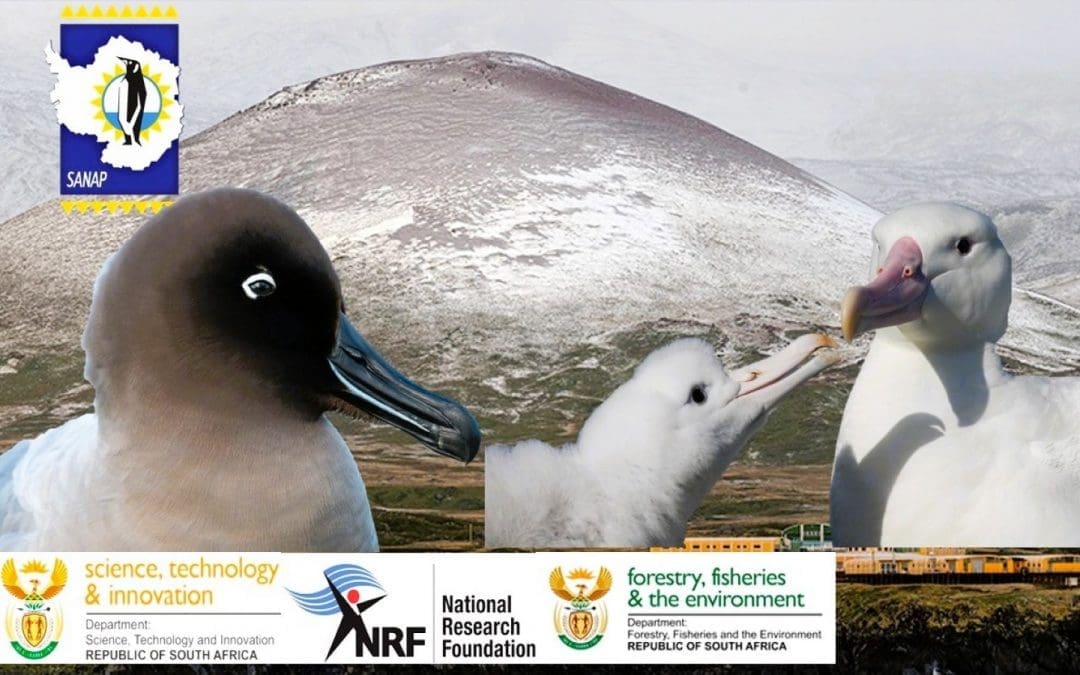

 The
The 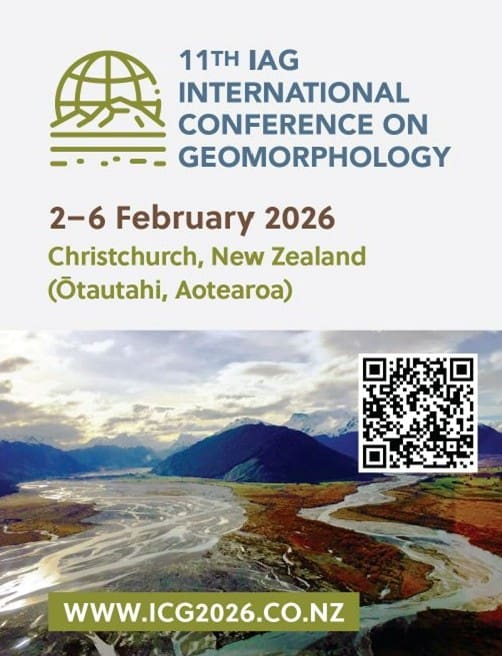
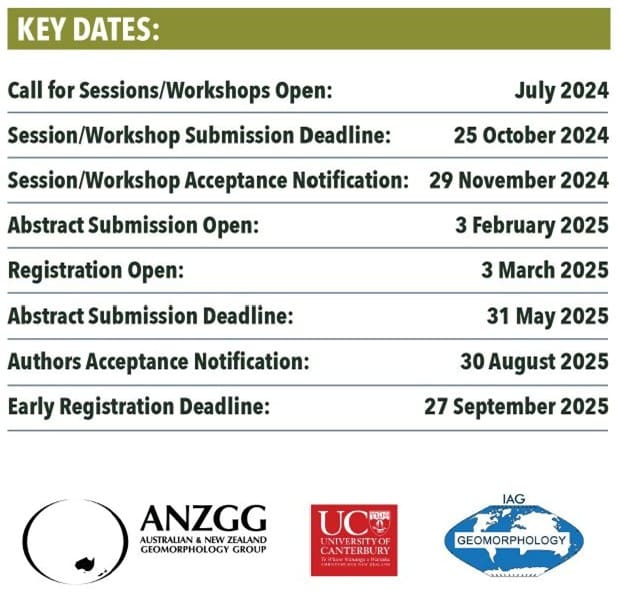 Who Should Submit?
Who Should Submit?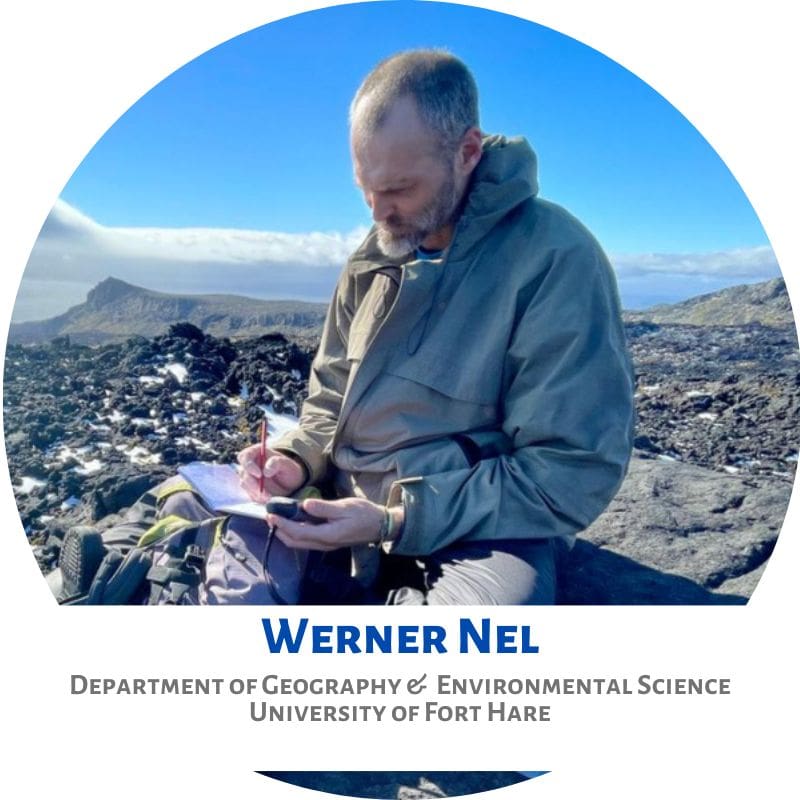 Message from Prof Werner Nel:
Message from Prof Werner Nel: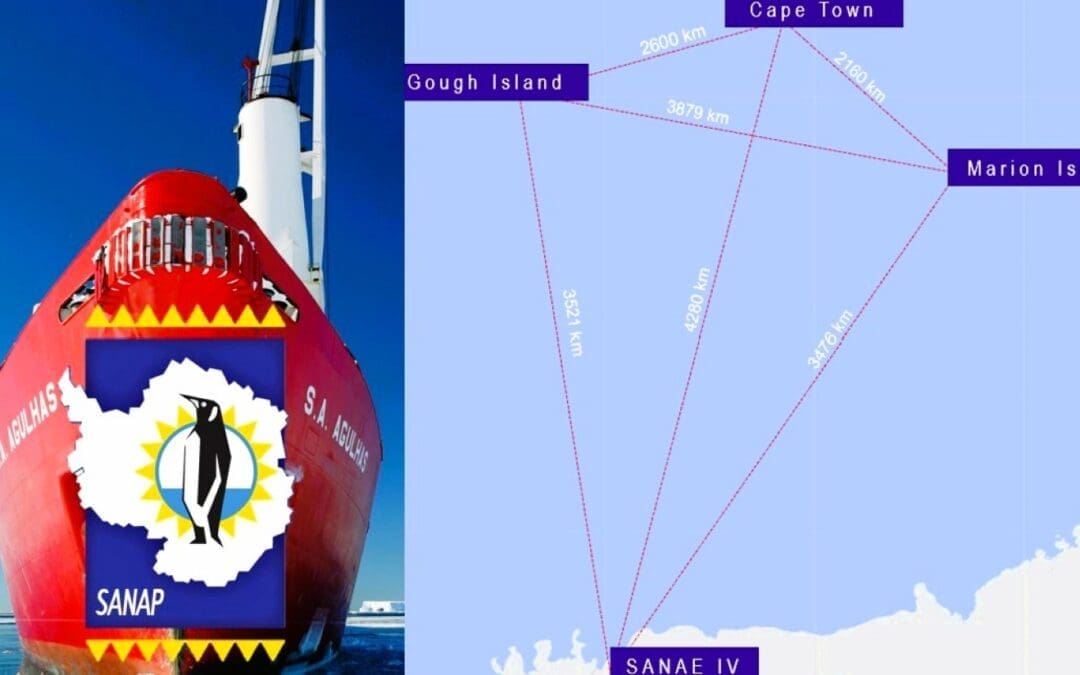
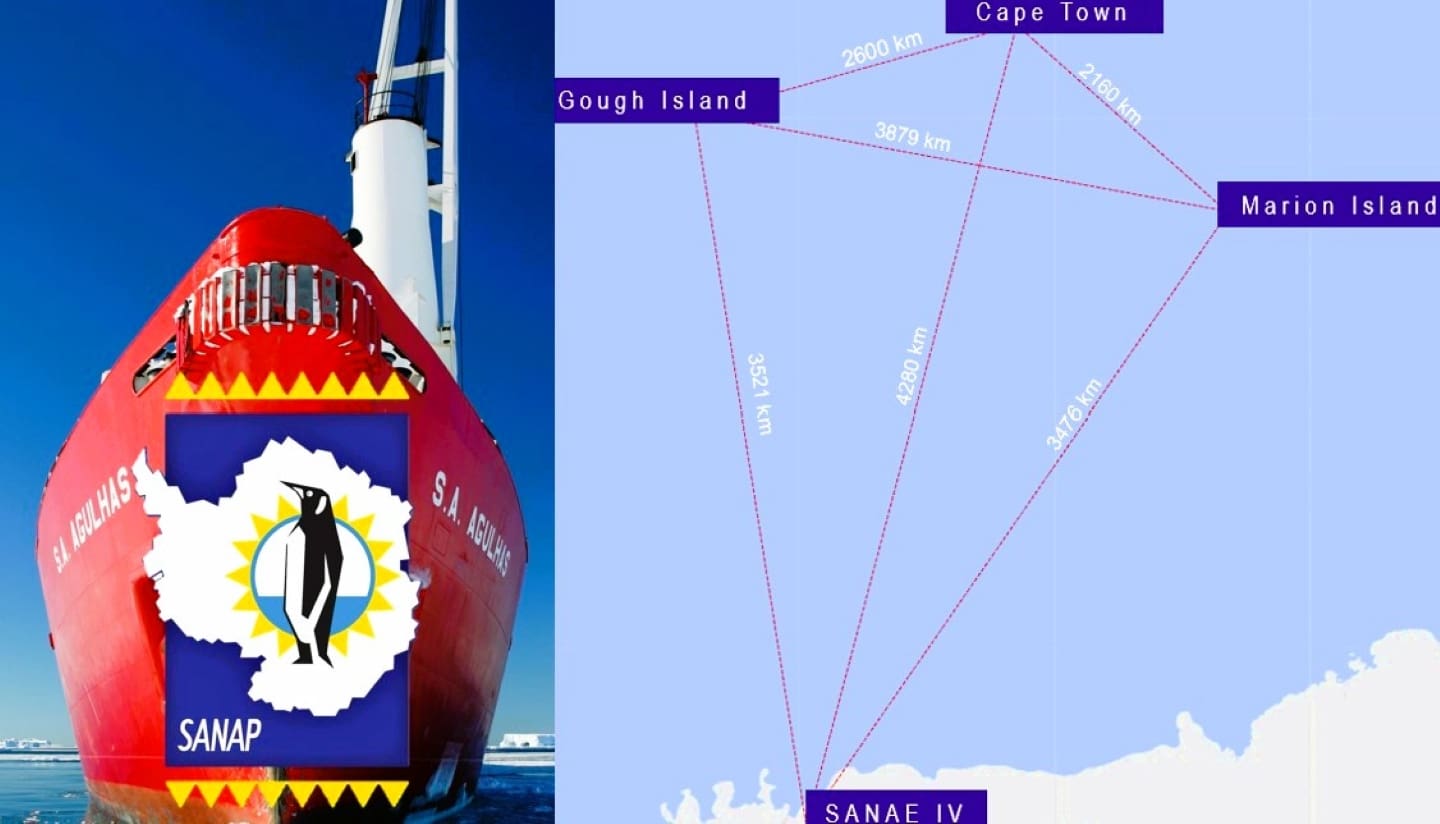
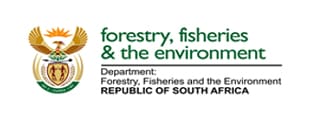 The Department of Forestry, Fisheries and the Environment is pleased to announce the upcoming voyage schedule for the S.A. Agulhas II for the 2025/2026 season. This state-of-the-art polar research and supply vessel will continue its vital role in supporting South Africa’s research stations in Antarctica and the sub-Antarctic islands. Below is the planned itinerary provided by the Department of Forestry Fisheries and the Environment:
The Department of Forestry, Fisheries and the Environment is pleased to announce the upcoming voyage schedule for the S.A. Agulhas II for the 2025/2026 season. This state-of-the-art polar research and supply vessel will continue its vital role in supporting South Africa’s research stations in Antarctica and the sub-Antarctic islands. Below is the planned itinerary provided by the Department of Forestry Fisheries and the Environment: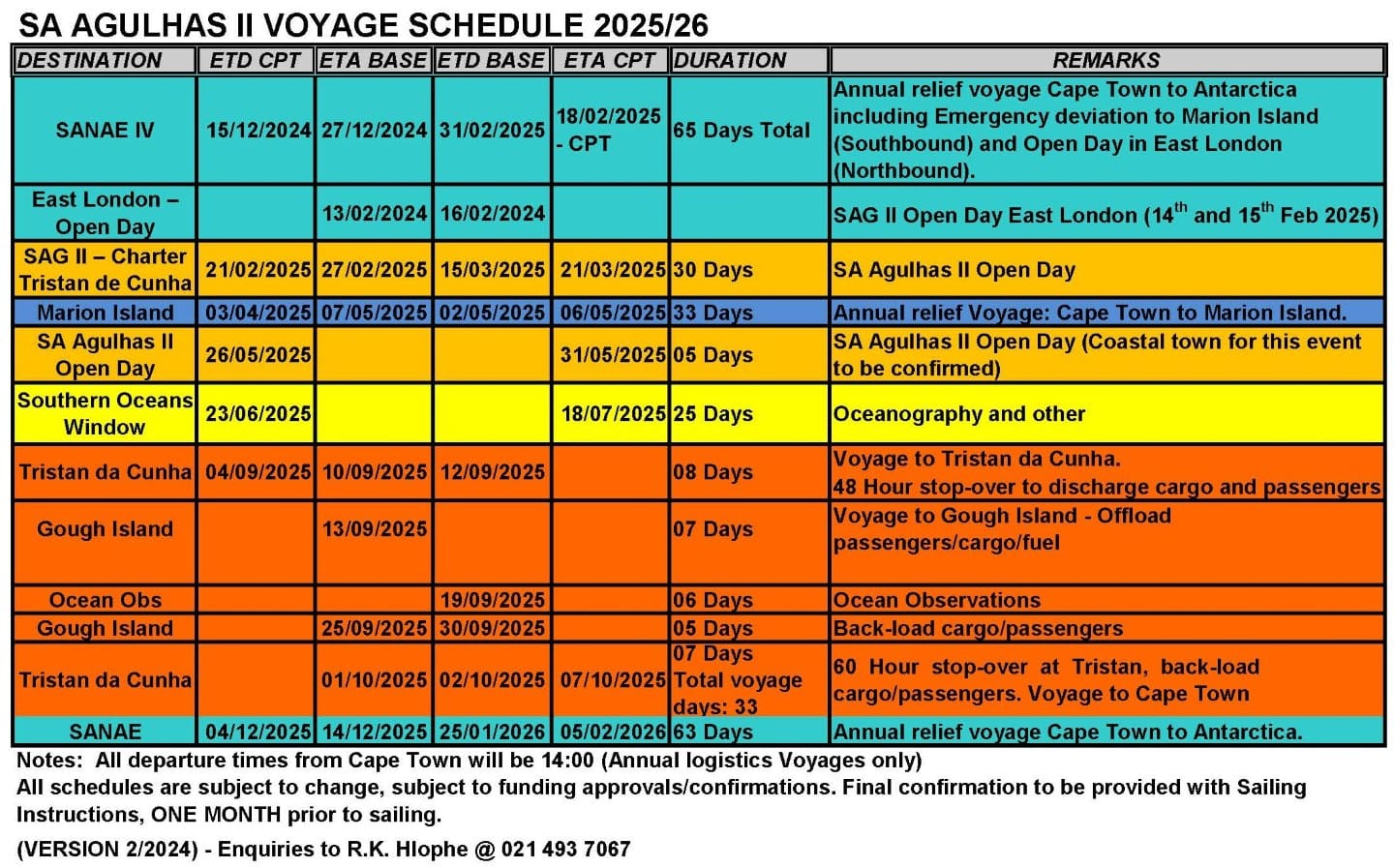

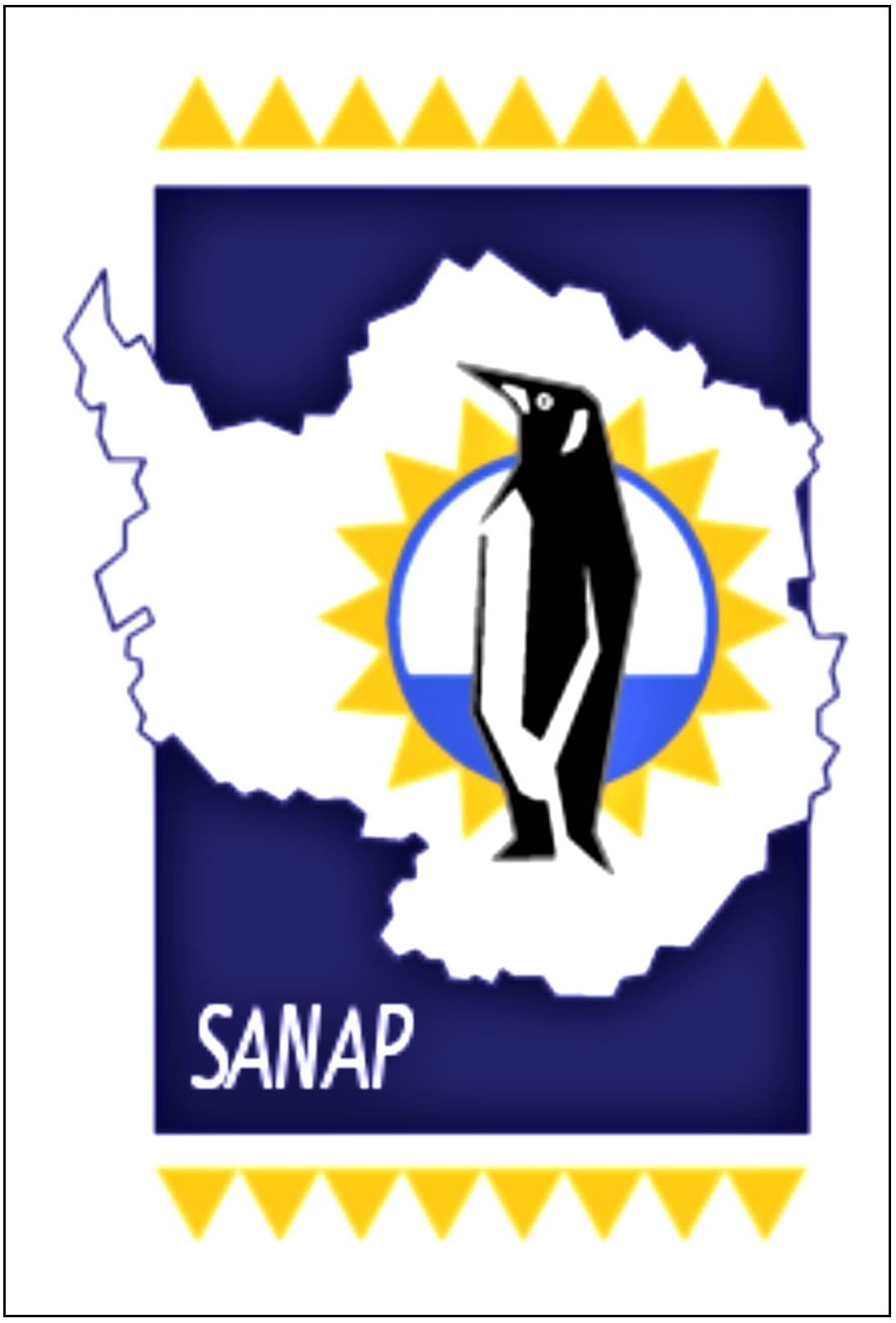
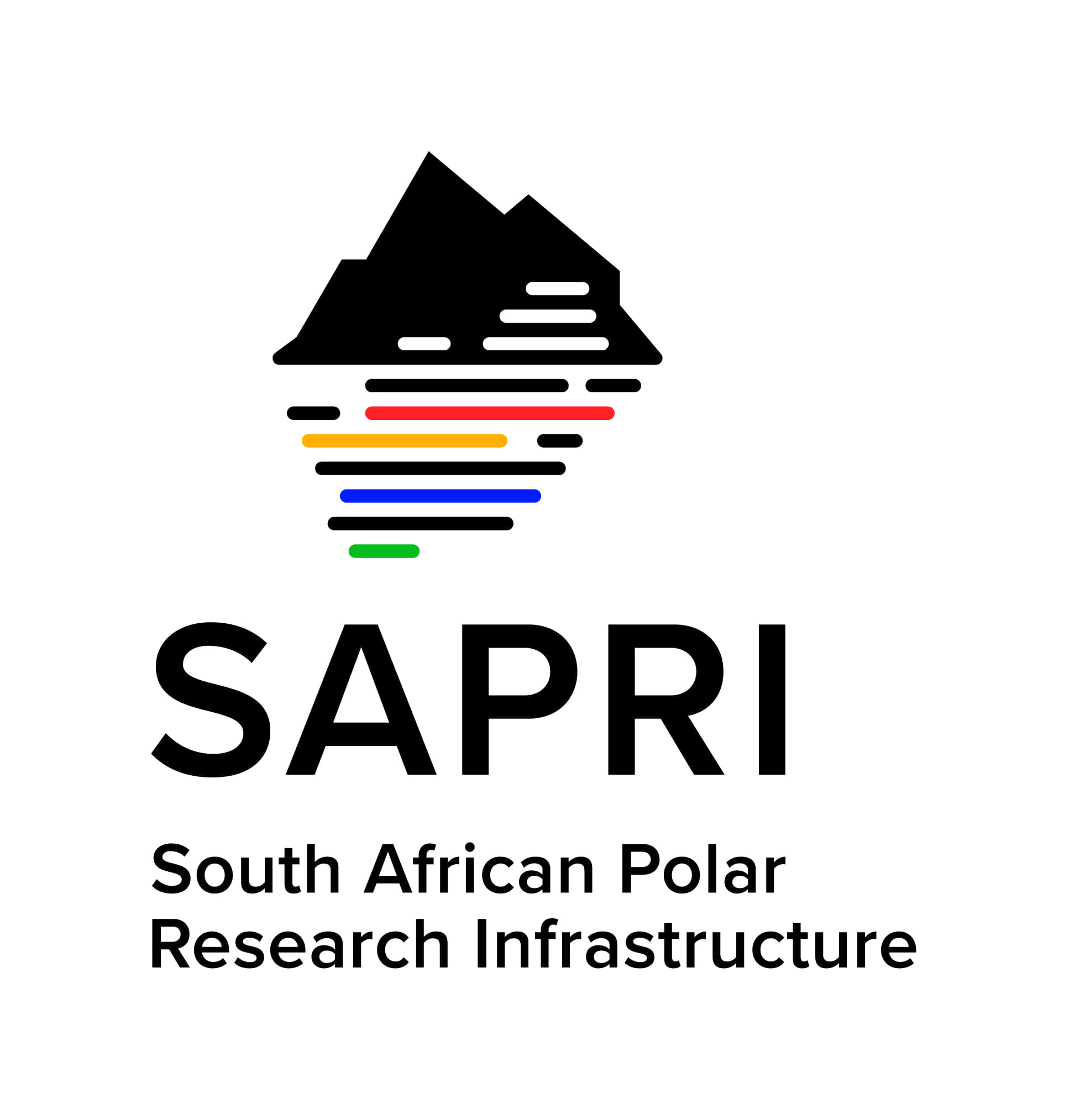 Antarctica, a pristine and remote frontier of scientific discovery, has long been a region of international interest for climate research, biodiversity, and understanding global environmental changes. In a recent meeting, held at SAEON Egagasini Node in Cape Town the event brought together
Antarctica, a pristine and remote frontier of scientific discovery, has long been a region of international interest for climate research, biodiversity, and understanding global environmental changes. In a recent meeting, held at SAEON Egagasini Node in Cape Town the event brought together 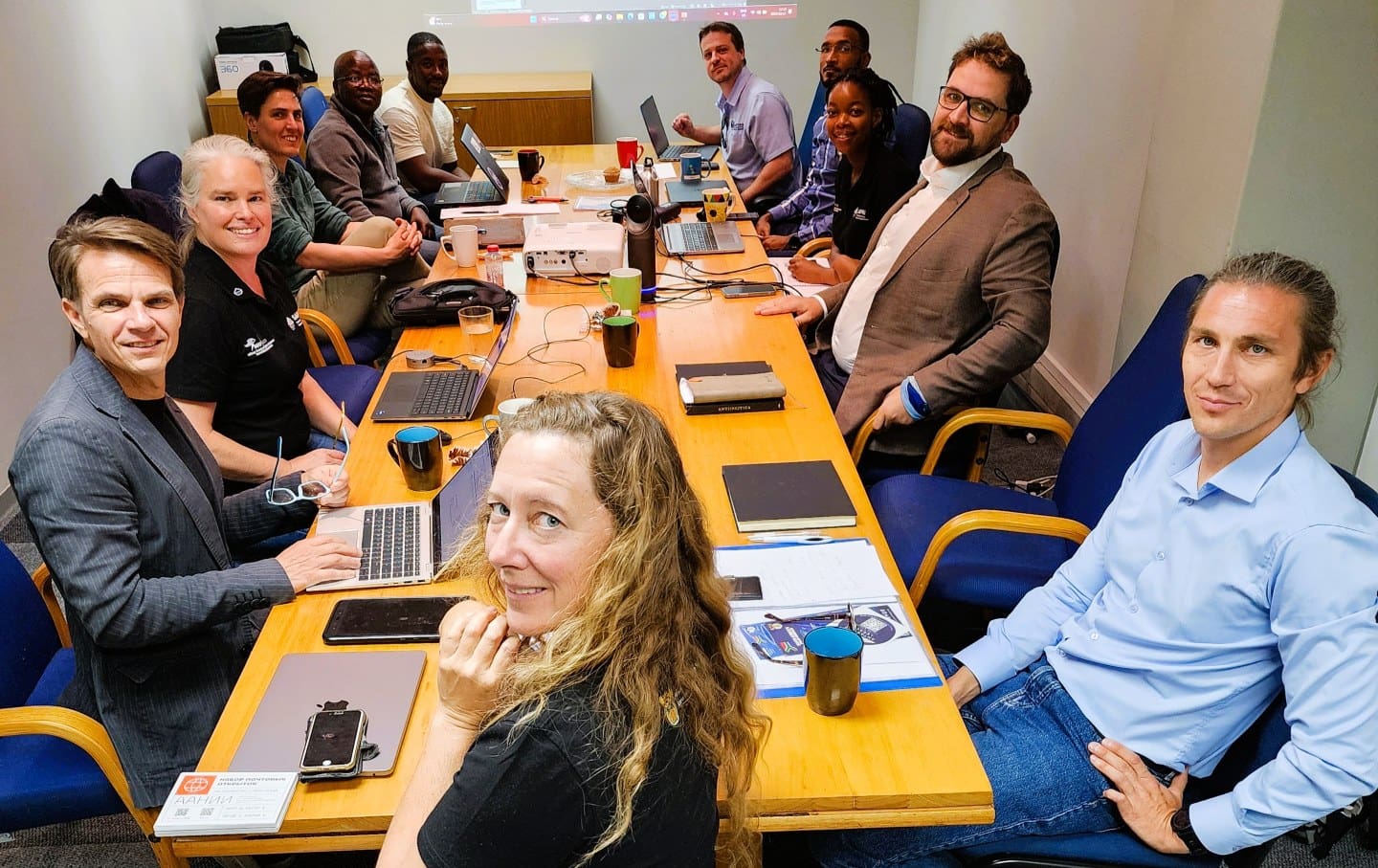 Attending in Person, Prof Juliet Hermes, Prof Marcello Vichi, Dr Anne Treasure, Ria Olivier, Dr Robyn Verrinder, Thomas Mtontsi, Steve Tebele, Jonathan Ward, Mark McKechnie, Rabia Mathakutha, Dr Sandy Thomalla, Dr Alexander Makarov, Dr Maxim Tatarkin
Attending in Person, Prof Juliet Hermes, Prof Marcello Vichi, Dr Anne Treasure, Ria Olivier, Dr Robyn Verrinder, Thomas Mtontsi, Steve Tebele, Jonathan Ward, Mark McKechnie, Rabia Mathakutha, Dr Sandy Thomalla, Dr Alexander Makarov, Dr Maxim Tatarkin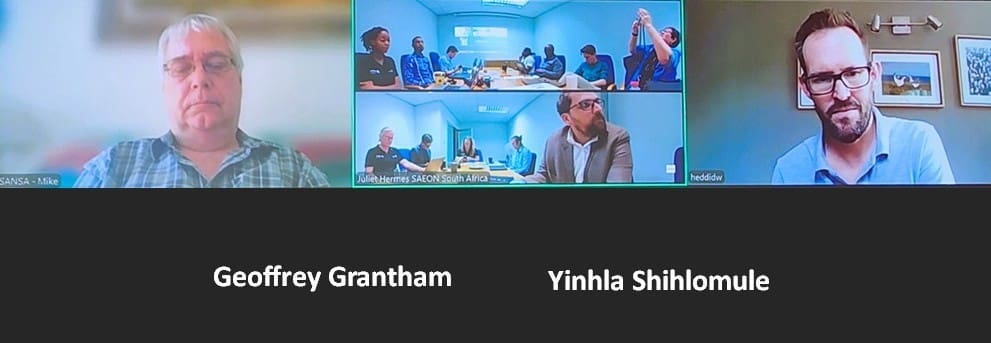 The meeting was in hybrid format and was attended online by Dr Michael Kosch, Dr David Hedding, Dr Geoff Grantham and Yinhla Shihlomule
The meeting was in hybrid format and was attended online by Dr Michael Kosch, Dr David Hedding, Dr Geoff Grantham and Yinhla Shihlomule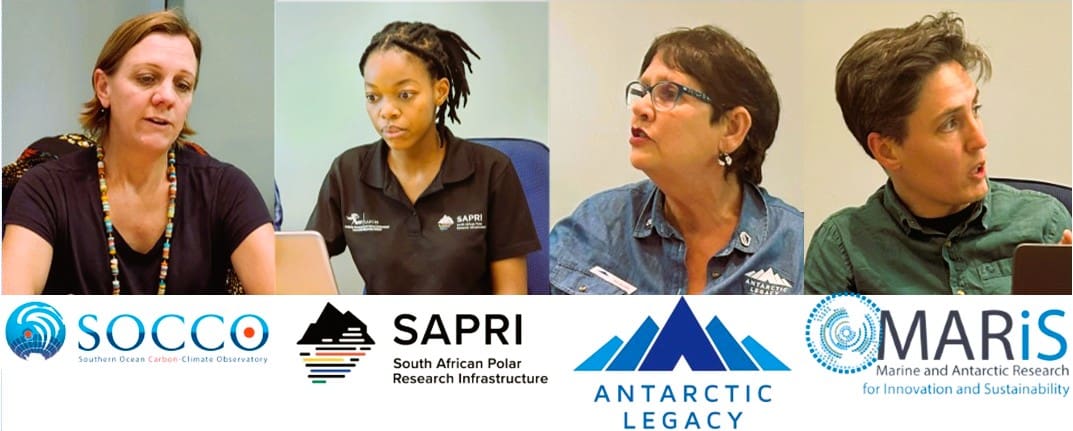 The in-person presenters that started the South African Discussions and presenatations: Dr Sandy Thomalla – SOCCO, Rabia Mathakutha – SAPRI, Ria Olivier- ALSA, Dr Robyn Verrinder-MARIS
The in-person presenters that started the South African Discussions and presenatations: Dr Sandy Thomalla – SOCCO, Rabia Mathakutha – SAPRI, Ria Olivier- ALSA, Dr Robyn Verrinder-MARIS The following presentations were done:
The following presentations were done: 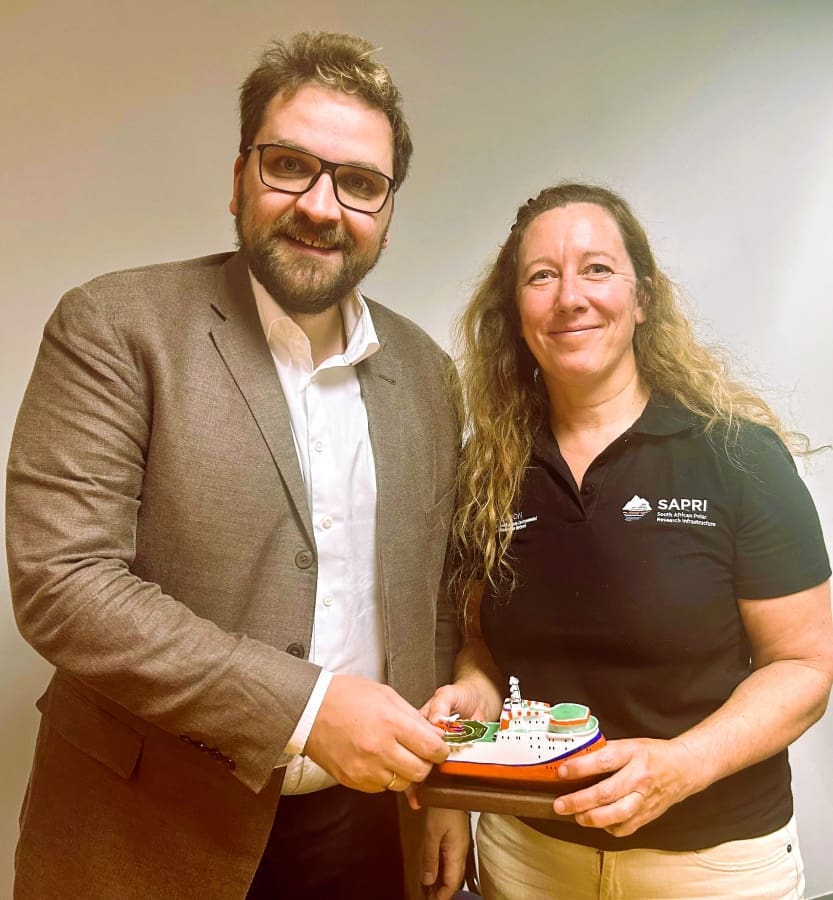 Dr Makarov present a gift to Prof Juliet Hermes of the ice resistant platform ‘North Pole’
Dr Makarov present a gift to Prof Juliet Hermes of the ice resistant platform ‘North Pole’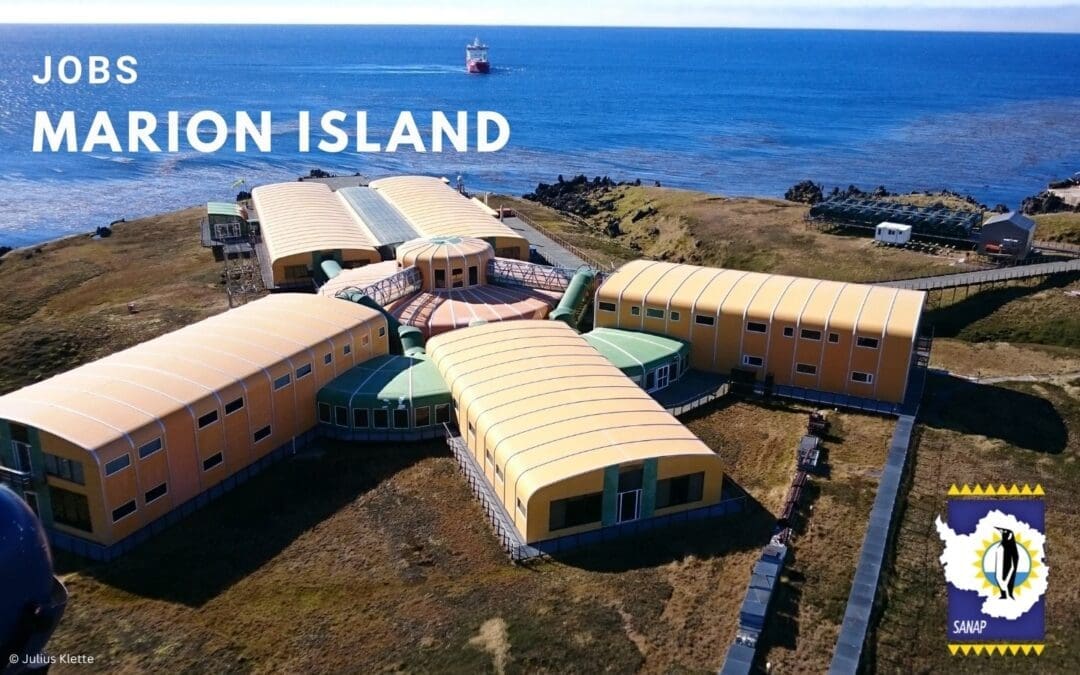
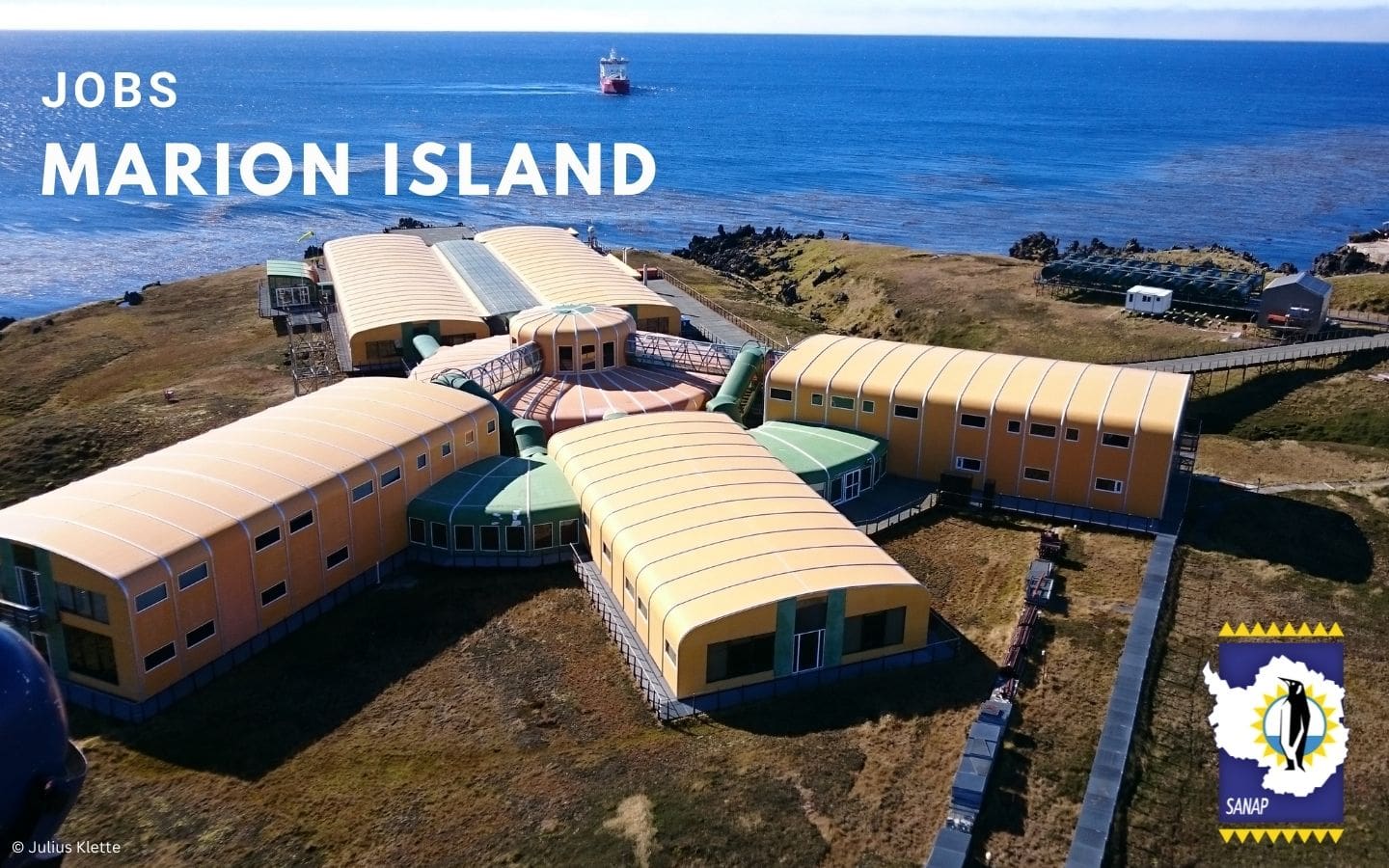

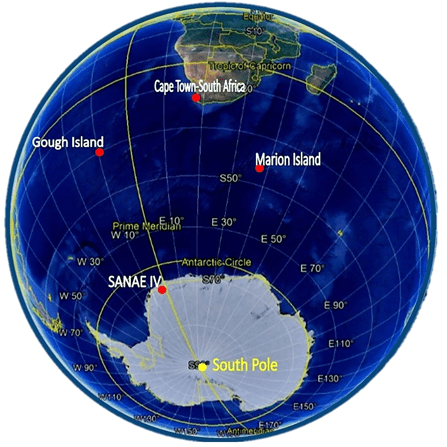 South Africa has long had an
South Africa has long had an 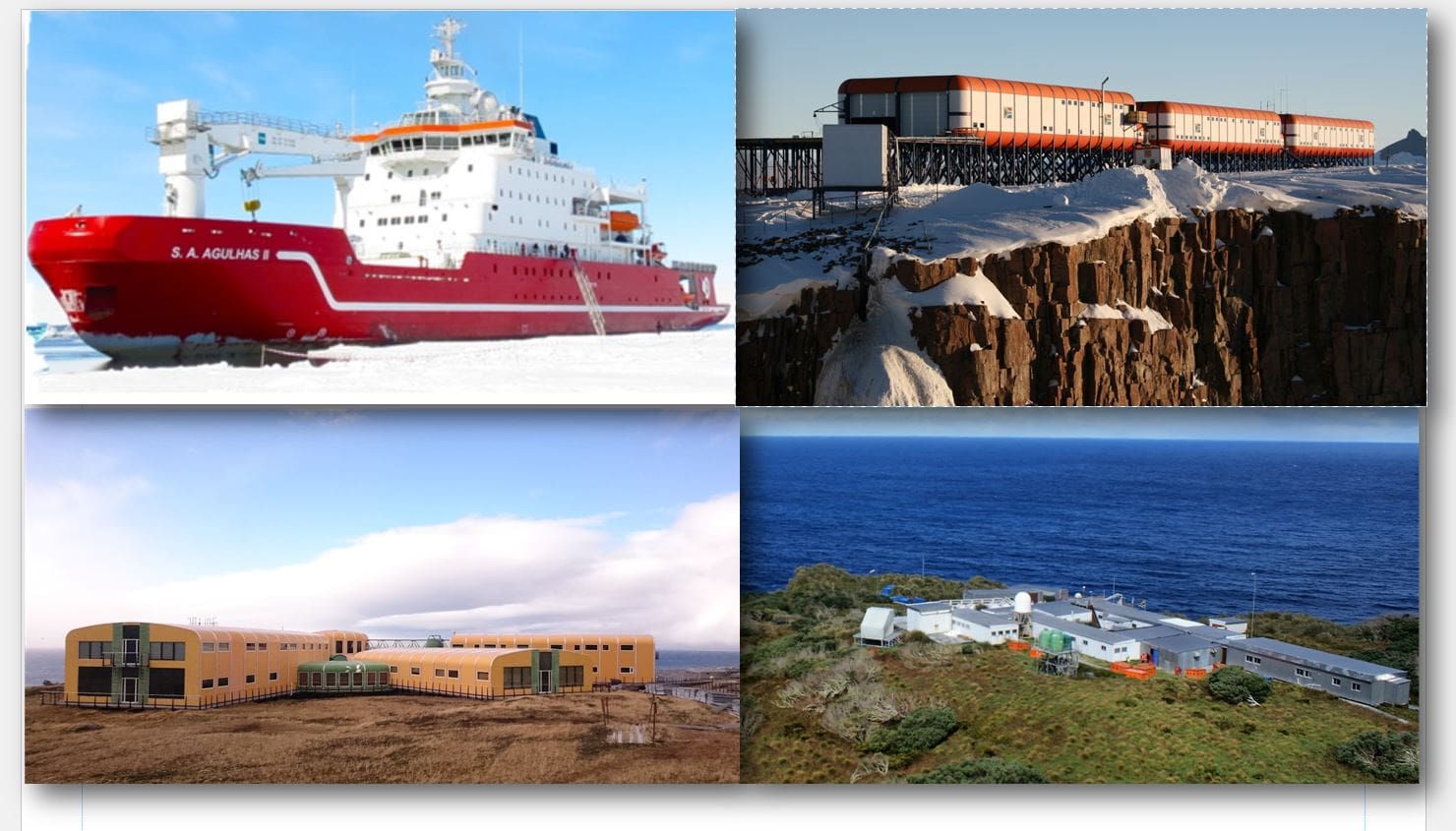 The project works together with scientific research but is focused on approaching the relationship between Africa and Antarctica from a different lens: creative, critical, historical, futurist; focused on questions of aesthetics, ethics, value, storytelling; and with the explicit intention to transform Antarctic participation in relation to race, class and gender.
The project works together with scientific research but is focused on approaching the relationship between Africa and Antarctica from a different lens: creative, critical, historical, futurist; focused on questions of aesthetics, ethics, value, storytelling; and with the explicit intention to transform Antarctic participation in relation to race, class and gender.




